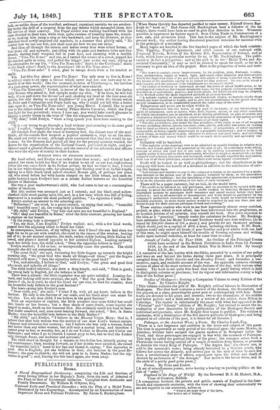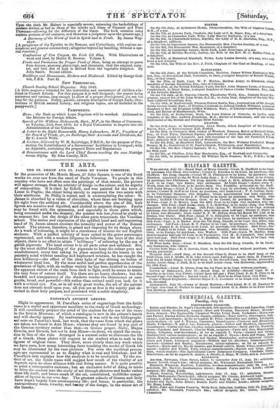PUBLICATIONS RECEIVED.
Boog.s.
A. Naval Biographical Dictionary: comprising the Life and Services of every Living Officer in her Majesty's Navy, from the rank of Admiral of the Fleet to that of Lieutenant inclusive. Compiled from Authentio and Family Documents. By William R. O'Byrne, Esq. National Evils and Practical Remedies; with the Plan of a Model Town. Illustrated by two Engravings. Accompanied by an Examination of some important Moral and Political Problems. By James S. Buckingham.
[When Dame Quickly has departed pacified to raise money, Falstaff directs Bar- dolph to " hook on." Had James Silk Buckingham been a follower of the fat knight, there would have been no need to give that direction to him. Whatever question is uppermost he fastens upon it, from China Trade to Communism of a new, safe, and attractive kind. This last is the subject of Mr. Buckingham's present work; the author having discovered practical remedies for national evils in the principle of association.
Many topics are handled in the five hundred pages of which the book consists: War, Tippling, Popular Ignorance, and other causes of our national evils, Financial Reform, Reform of the Reform Bill, Regeneration of Ireland, and BO forth, which have no particular novelty for us, or Mr. Buckingham. The publi- cation is in fact a prospectus; and as the pith is in the "Model Town and As- sociated Community," it may as well be allowed to speak for itself, so far as is necessary to give an idea of the project. Here is the prospectus of town and terri- tory. " The town to contain every improvement, In its position, plan, drainage, ventila- tion, architecture, supply of water, light, and every other elegance and convenience which the improved state of art and science will admit of being conferred on it, within the means of the available capital to be raised for that purpose. Its size to be about mile square, and the number of its inhabitants not to exceed 10,000. "An extent of territory or farm-land around the town of about 10,000 acres, to be purchased or rented on the longest attainable lease, for the purpose of introducing every description of agriculture, pasture, and horticulture, for which its soil may be adapted, to be worked under the most Improved methods at present known.
" A suitable variety of manufactures and handicraft trades, to include chiefly those which are least Injurious to health, and to give the predominance to the useful over the merely ornamental, to be established nearest the outer edge of the town." Temperance and peace are to reign within it.
" The introduction into the town, or any part of its estate, of any intoxicating li- quids or substances, such as spirits, wine, beer, liquors, opium, or any other materials by which intoxication can be produced, to be strictly prohibited, on pain of seizure and destruction wherever found, and the expulsion from the association of the parties proved
guilty of Introducing them, with the forfeiture of ail their rights. * • *
"The like prohibition, and under the like penalties, of the entry or use of all weapons of war, including sabres, spears, bayonets, guns, pistols, and other tire-arms, as leading first to fatal accidents, and next to vindictive uses; of gunpowder, or other explosive compounds, as being equally unnecessary In a peaceable community ; and of tobacco in every shape, as injurious to health, offensive to delicacy and good taste, and involving a waste of time and money which could be so much more usefully and agreeably em- ployed."
Gallantry will be banished.
" The sanctity of the marriage vow to be admitted as equally binding in religion as In morals, and female parity to be protected by the arm of all; in conformity with which, persons of either sex (and not of one only, as in existing communities) to be held equally guilty if detected in illicit intercourse, whether in single or married We; so that seducers and seduced, betrayers and betrayed, shall be equally expelled the association, with loss of all their privileges, on proof of their guilt being legally established."
Profit will be looked to as well as philanthropy; and the shareholders in the company will have the benefit of a dividend in addition to the satisfaction of serv- ing the human race. "Individuals and families to pay to the company a rental, to be regulated by a mode- rate interest on the actual cost of the premises occupied by them, as the association will provide the buildings but the furnishing of the apartments or houses thus occupied to be at the expense and according to the taste of each occupant."
There will be a paper currency, but no tick, in the model town. "No credit to be allowed on any purchases, and no accounts to be opened with any parties, to avoid the evil which facility of credit creates, in inducing thoughtless and imprudent persons to anticipate their resources and spend money before they have earned it ; and as all materials of manufacture and trade would be purchased by the company's authorized commissioners, and as the rents would be reserved from each monthly payment, no more ready money would be required by auy one than just Suf- ficient to pay for their current purchase of food and clothing."
Thom curious readers who wish to see how ingeniously almost every crotchet, project, or plan, which is now afloat, has been interwoven into the programme, so as to catch persons of all opinions, may consult the book. One great objection to the idea as a "practical" remedy meets the calculator in Undue. Mr. Bucking- ham estimates that his Model Town and Territory would cost four millions, (to be raised by 200,000 shares of 201. a piece,) and provide for ten thousand persons; which would just be a capital of 4001. a head, including children. If Mr. Buck- ingham could only endow all heads of poor families and poor adults with one half of this BUM, he might spare himself the trouble of forming schemes and writing books upon national remedies, at least for some time to come.] Annals of India for the Year 1848. An Outline of the Principal Events which have occurred in the British Dominions in India from 1st January 1848, to the end of the Second &Bch War in March 1849. By George Buist, LL.D., &c. [A narrative of the late battles with the Sikhs, preceded by a review of our policy and wars on and beyond the Indus during these past years. It is principally compiled from the Delhi Gazette and the Bombay Times; and furnishes a con- secutive, rapid, and readable account of the war. An appendix contains obituary notices of some of the most eminent Anglo-Indians of the day, with various other matter. The book is not quite free from that tone of party feeling which is held to distinguish colonies or provinces; but its vigour and information convey a high idea of the Indian press.] Studies of Shakspere: forming a Companion Volume to every Edition of the Text. By Charles Knight. [This volume contains the pith of Mr. Knight's critical labours in illustration of Shakspere. The first book contains a review of the dramas, the dramatists, and the players as a class, precedingthe great poet or contemporary with him. Seven books are devoted to his plays and sonnets; two to the dramatists of his middle and latter period; and a final section to a review of his critics, from Milton to Coleridge. The matter is substantially the same with what has appeared in the "Pictorial" and "Library" editions of Mr. Knight ; but revised to admit the in- troduction of new discoveries by the publications of the Shakspere Society and individual antiquarians, since Mr. Knight first began to publish. The volume is handsome, with a frontispiece of the five known portraits of Shakspere; and being adapted to all editions of the poet, it is fitted for all libraries.] Palenque, or the Ancient West; a Poem. By Charles Lamb, Esq. [There is a raw largeness and ambition in the scene and subject of this poem. The time is apparently an early period of the classical ages; the scene Mexico, in America; whither have escaped the giants spoken of in Scripture before the Flood, and these personages are engaged in war with the monarch of Palenque. This may be called the poetical history of the piece: the romance arises from a Phoenician trader having carried off a couple of maidens from Greece, as presents to Aretzin the victor King of Palenque. " The Argive Inc)," the chosen one, is cold to the monarch's vows; being already betrothed to a Grecian youth, who follows her across the Atlantic, and arrives just in the nick of time to save Ino from a revolutionary state of affairs, consequent upon the defeat and death of Aretzin by an invasion of "the Asteque." The metre is the heroic verse, and in the style of a pretty good prize poem.] Poems. By Fritz and Liolett. [A set of miscellaneous poems, sonic having a bearing OD passing politics on the side of "order."]
England in the Days of Wick): By the Reverend ES. IL Hubert, MA., Vicar of Croxton, Norfolk.
[A comparison between the private and public morals of England in the four- teenth and nineteenth centuries, with the view of showing that substantially we are not superior to our ancestors, unless in
"what's aft mak than a' the lave, Our better art o' hiding." Upon the cloth Mr. Hubert is especially severe; esteeming the backelidings of modern divines as bad as those of the monks and friars of Chaucer and Piers Plowman—allowing for the difference of the times. The book contains some carious pictures of old manners, and threatens a judgment upon the present age.]
A Harmony of the Word of God in Spirit and in Truth. By James Wap-
shaw.
[A paraphrase of the Epistles to the Romans and Corinthians, with copious an- notations and general commentary; altogether beyond lay handling, without a spe- cial vocation.]
- Confessions of Con Cregan, the Irish Gil Bias. With Illustrations on wood and steel, by Hablot B. Browne. Volume I.
Fruits and Farinacea the Proper Food of Man; being an attempt to prove from history, anatomy, physklogy, and chemistry, that the original, natu- ral, and best diet of man is derived from the vegetable kingdom. By John Smith. Second edition.
Buildings and Monuments, Modern and Mediceval. Edited by George God- win, b'.RS. Part IL
NEW PERIODICAL.
Church Sunday School Magazine. July 1849. [A little magazine intended for the instruction and amusement of children edu- cated in Church Schools. For this purpose it is well designed ; the papers being numerous and various, long enough to allow of a proper development, yet not too long for the patience. Poetry, parable, extracts descriptive of foreign lands, illus- trations of British natural history, and religious topics, are all included in the pennyworth.]
PAMPHLETS.
Rome ; the Rock on which Louis Napoleon will be wrecked. Addressed to the Minister for Foreign Affairs.
Speech of Sir William Molesworth, Bart., .3.11P., in the House of Commons, on Tuesday, 25th June 1849, for a Royal Commission to Inquire into the Administration of the Colonies.
A Letter-to the Right Honourable Henry Labouchere, M.P., President of _ the Board of Trade, 4c., on Railways, their Accounts and Dividends, &c. 7 By C. Loeock Webb.
Lecture, delivered by W. H. Bainbrigge, F.R.C.S., for the purpose of Pro- _ _xi-toting the Establishment of a Governesses' Institution in Liverpool; with an Appendix, containing the proposed Rules and Regulations.
A Remonstrance with the Lord Chief Baron touching the case Nottidge versus Ripley. By John Conolly, M.D.



























 Previous page
Previous page